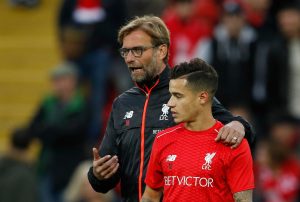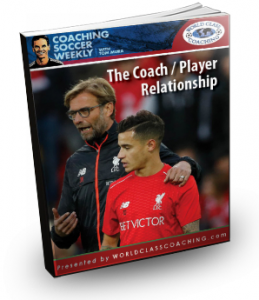Podcast: Play in new window | Download
Subscribe: Apple Podcasts | RSS
 I noticed a big improvement in my player’s shooting balance and technique during our games last weekend. I talked about the session I did with them in Episode 88 – Balanced Shooting.
I noticed a big improvement in my player’s shooting balance and technique during our games last weekend. I talked about the session I did with them in Episode 88 – Balanced Shooting.
We talked about the key points before the game so that they were fresh in the minds of the players. I think it’s important to do this with my players in order to make more of a connection between what we do in training and what I’m looking for on game day.
Coaches relate what they’re doing in training to game situations all of the time but talking about training before games reminds them of the work they’ve done during the week and makes it more likely that you’ll see a good transfer of training to the match.
I came across this video this week that shows adults trying to play on a HUGE field that is much too big for them. They relate this back to the challenge faced by 11 and 12 year olds trying to play on a full sized field.
The video is from a few years ago but I thought it provided a good explanation of the need for children to play on a field that’s in proportion to their physical and technical abilities.
If you think that youth players should start playing, ‘real soccer’ as soon as possible I hope that this video helps you think twice about that idea.
 This week’s question is from Mike and he’s asking about a point I made in last week’s shooting episode.
This week’s question is from Mike and he’s asking about a point I made in last week’s shooting episode.
Mike says:
“My question is, I started teaching my girls to plant their foot in front of the ball while it is rolling forward so when they strike the ball their plant foot is in the proper place. As the girls were doing this they noticed a better strike on the ball. Should I keep focusing on that part also or just concentrate on the balance alone?”
The way Mike approaches this with his players makes sense, the ball is rolling away so planting in front will mean the ball is in the right place when the foot swings through to strike the ball.
On the podcast I go through how I use coaching points like this with individual players rather than the whole team.
This week I talk to George Nichols about the study he did for his Masters in Sports Coaching dissertation. It’s focused on the qualities of a healthy coach / player relationship. We discuss how he organized the study, the questions he ask, the common themes that emerged, the Honesty – Truth – Respect Spiral and his keys to creating a great relationship with your players.
The show notes include a complete transcript of our discussion as well as the ‘Mind Maps’ that George talks about in this episode.
Printable Show Notes
The show notes for each episode are accessed through the WCC Training Center.
They are FREE but you will need at least a Free Membership to the Training Center in order to view and print them. They’ll be available there for eight weeks before they’re placed in our archive which can be accessed at any time by Pro and Elite Members.
Click on the image of the notes and if you’re already logged in to the Training Center you’ll be taken to the Podcast page. If you’re not logged in your be taken to a login page where you’ll also be able to login or register if you are not already a Member.
Remember!
Make sure you subscribe to Coaching Soccer Weekly through iTunes, or your podcast provider of choice, to be sure you never miss an episode.
We would appreciate it if you would leave us a 5 star rating and/or a written review on iTunes to help spread the word about the show and ensure that we can continue to bring you top notch guests in the future.
Next Week
I haven’t settled on a topic for next week. There are a couple of things I’m working on so the one I get most excited about will probably win out. Check back next week to find out what it is.


Big thanks to Tom for inviting me to talk about my dissertation project for an episode of the podcast here.
I reflected after the conversation that I wish I had made more of ‘caring’ for the take home messages. Tom made a big point of that on the ‘Qualities of the Best Coaches’ episode, and that was also a big thing from my interviews. Even that same phrase was used by my participants “they don’t care what you know until they know you care” – for me, so important for coaches at all levels. I thought it might be useful to then share some practical examples from the interviews and my own experience:
1. Empathy. Being supportive of injured players, for example – if it’s long-term, keep checking in with them, make sure they still feel involved when they can’t train or play. If a player has been ill, first time they’re back in training, you know “hey, heard you had a nasty cold – feeling better now?” – little things like that can really go a long way in building trust and respect.
2. Greeting your players warmly! We can be lost in our thoughts sometimes before sessions, thinking about what we’re doing, the set up, coaching points, etcetera – don’t forget to be happy to see your players – say hello, maybe share a little joke, things like that.
3. Finally, I would add – take advantage of opportunities to small talk with players (and parents!) rather than avoid them. Again, these simple little conversations – “how was your day? what did you do in school” etc – can go a long way!
Feel free to feedback on anything here, would be great to have some interesting conversation/debate on what I believe to be the crux of coaching – positive relationships with your players. Hope you enjoyed the episode!
Thanks George!